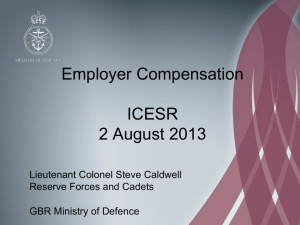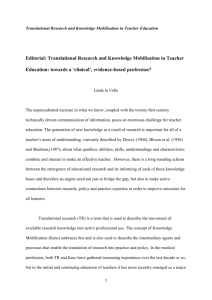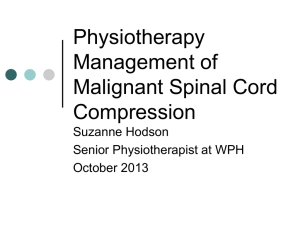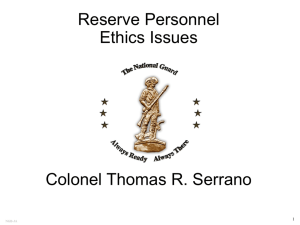Reservist employer handbook
advertisement
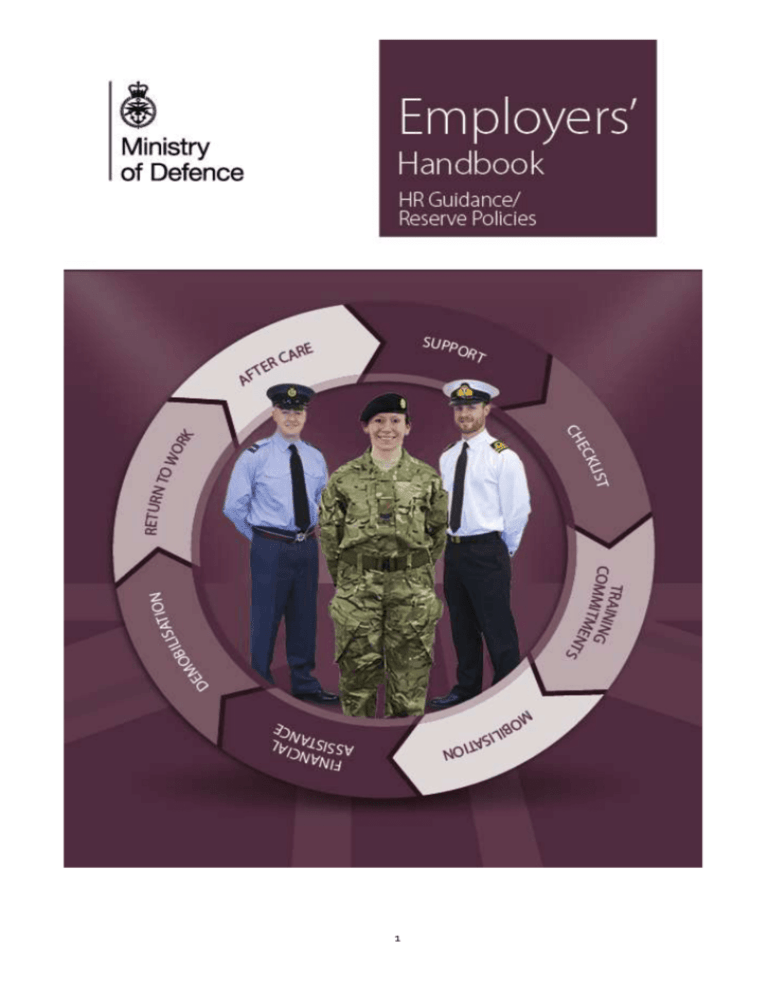
1 Contents What is a Reservist? ........................................................................................................... 3 Statement of Support ........................................................................................................ 4 Recording Reservist Details ............................................................................................... 4 Managing Training Commitments ..................................................................................... 5 Managing Mobilisation ...................................................................................................... 6 Mobilisation Actions .......................................................................................................... 8 Terms and Conditions during Mobilisation ........................................................................ 8 Financial Assistance ......................................................................................................... 11 Demobilisation ................................................................................................................ 15 Return to work ................................................................................................................. 15 After care and support ..................................................................................................... 17 Annex 1 – Manager’s checklist ......................................................................................... 21 Annex 2 – Reservist’s checklist ......................................................................................... 28 Template A – Mobilisation Letter .................................................................................... 33 [Text in Blue is adaptable depending on your company policy. For the purposes of this document, it represents best practice] 2 1. Introduction This document explains procedures for managers and employees. It covers: Actions for employees or if they want to become Reservists Guidance for line managers on how to manage Reservists Managing requests regarding time off for training Guidance and actions for when a Reservist is mobilised, demobilised and returns to work. 2. What is a Reservist? There are two main types of Reservist: Volunteer Reservists - civilians recruited into the Royal Naval Reserves, Royal Marines Reserves, Territorial Army and Royal Auxiliary Air Force. Regular Reservists - ex-regular servicemen who may retain a liability to be mobilised depending on how long they have served in the Armed Forces. They make up a significant element of the nation’s total defence capacity and are called upon as individuals for their specialist skills or as ready formed units when required. They receive the same world class training and develop the same skills as their regular counterparts, which means they can carry out the same roles to the exacting high standards. 3 3. Statement of Support The company aims to support our employees who are members of the Reserve Forces with a commitment to train regularly and a liability to be mobilised for a period of full time military service. Line Managers should support these commitments and work with the Reservist employee to facilitate training requests and longer periods of absence for mobilisation. For their part, the Reservist employee has a responsibility to manage these requests by providing adequate notice for training commitments to enable Line Managers to plan accordingly. 4. Recording Reservist Details If an employee is a Reservist, is considering renewing their Reservist commitment or is interested in joining the Reserve Forces, they must discuss this with their manager prior to any action. Both the manager and the employee should familiarise themselves with the Reservist HR Policy, and this guidance. Managers must maintain a record of the Reservist’s details which should be updated to reflect training and mobilisation commitments. Reservists must also seek approval if they intend to volunteer for High Readiness Reservist status; they accept an increased liability for mobilisation making them liable to be deployed with minimal notice). 5. Managing Training Commitments The company provides X days/weeks additional paid leave for the attendance of Reservist training. 4 Line Mangers will be flexible and aim to facilitate work rosters to allow attendance at annual continuous training (annual camp) and other training commitments e.g. weekly or weekend training sessions. Reservist employees should give managers as much notice as possible to allow appropriate planning for absences. Permission once given will not be rescinded unless there are exceptional circumstances. Reservists are typically committed to 19 - 27 days training per year depending on which Service they belong to and any specialist skills with an average training requirement of 24 – 40 days. Training tends to take place 1 evening per week, over various weekends throughout the year and one 2 week continuous training period, also known as ‘annual camp’. Training commitments vary but in most cases include: Weekly training - most Reservists train at their local centre for around two-and-a-half hours, one evening a week. Weekend training - all Reservists are expected to attend a number of training weekends which take place throughout the year. Annual Continuous Training – one or more continuous periods not exceeding 16 days in aggregate. This is often a 2 week course sometimes referred to as ‘annual camp’. This training may take place at a training establishment, as an attachment to a Regular Unit, a training exercise or a combination of any of these. Training normally takes place within the UK but can and often takes place overseas. 5 Performance review/Appraisal Experience gained through routine training (and mobilisation) brings essential skills into the organisation, such as leadership, communication, team working and organisational ability. These skills and abilities lead to improved performance in the workplace and should be recognised and taken into consideration in an individual’s performance review/appraisal as well as considered as evidence of achievement in the application of knowledge and skills. Employment Tribunals The Defence Reform Act 2014 introduced legislation in the UK to provide reservists with immediate right of access, without a qualifying period, to an Employment Tribunal for unfair dismissal if the dismissal relate to Reserve Service. 6. Managing Mobilisation Mobilisation is the process by which an individual Reservist, or group of Reservists, is brought into permanent service with the Regular Forces, in order to make them available for military operations. The maximum period of mobilisation will depend on the scale and the nature of the operation and is typically no longer than 12 months. The call-out order, provides legal authority to mobilise Reservists. A call out notice which are also legally enforceable will be issued as formal notification of a Reservist’s mobilisation. Both the Reservist and their employer will receive a call-out pack. These will be sent by post to the Company or sometimes delivered in person by the Reservist. The documentation will include the call-out date (when the Reservist must report for duty at a specified mobilisation centre) and the anticipated timeline. While all Reservists are technically on immediate notice 6 for call-out, when circumstances permit it is Defence policy to give the Reservist and their employer notice. Whenever possible, the MOD will aim to give at least a minimum of 28 days’ formal notice of the date that the Reservist will be required to report to the mobilisation centre for contingency operations and 90 days notice for pre-planned operations, although there is no statutory requirement for a warning period prior to mobilisation. A period of mobilisation comprises three distinct phases: Acceptance into Service (Administration and Medical etc); Pre-Deployment Training, Deployment (or Task) and Post Operational Activity; Demobilisation including a period of Post-Operational Leave if applicable. The period of leave ends on the last day of permanent service. The Company supports mobilisation in all but exceptional circumstances and will release the employee for Reserve service. A call-out notice can be appealed if the Reservist absence is considered to cause serious harm to the business. The Reservists can also appeal against call out. Details of how to apply for a deferral/exemption or revocation of a call-out notice, as well as deadlines for appeal, are included in the employer’s call-out pack. 7 6.1 Mobilisation Actions Line Managers should do the following: Inform HR of impending mobilisation and first day of permanent military service, contained in the call out notice, so HR/payroll can adjust pay and benefits accordingly Complete consent form included in the call-out pack and any internal paperwork regarding mobilisation (consider template letter A within this guidance) Meet with Reservist employee to discuss mobilisation. This should include: Handover of work Return of any equipment Agree employee benefits entitlements and required actions (refer to checklists within this guidance that cover these e.g. Pay, benefits, pension arrangements etc) Keeping in touch - exchange contact details (e.g. email addresses) to enable both parties to do so. This will help with a smooth reintegration of the Reservist back into the workplace. Next of Kin details should also be updated. 6.2 Terms and Conditions during Mobilisation Pay The MoD will assume responsibility for the Reservist’s salary for the duration of their mobilisation. They will pay a basic salary according to the Reservist’s military rank. If this basic element is less than the Reservist receives from the company, it is the Reservist’s 8 responsibility to apply to the MoD for the difference to ensure that they suffer no loss of earnings. This is known as Financial Assistance and the Awards to Reservists. The company should suspend the Reservist’s salary during the period of mobilisation. Benefits All contractual benefits that are suspended by the employer during mobilisation can be claimed by the Reservist as part of their Reservist Award. Example benefits include: Health insurance Life insurance Company car The manager and Reservist should discuss benefit arrangements during the pre-mobilisation meeting. This should cover those benefits which will be suspended and for any continuing benefits, arrangements should be made as to how these are paid. Provide the Reservist with evidence of suspended benefits to support their claim for Financial Assistance. 9 Payroll Mobilisation does not break continuity of employment (s.217 (a) Employment Rights Act 1996) and therefore it is recommended: Not to issue a P45 (in line with HMRC guidance) for service of less than 12 months. For payroll purposes to put the individual on a period of ‘special leave’ Note that any period of mobilisation does not count towards reckonable service periods. See payroll guidelines on Reservists: https://www.gov.uk/employee-reservist The Company is not required to pay the Reservist’s salary during the period of mobilisation Pension If the Reservist is a member of the company’s pension scheme, and chooses to remain in it, under the Financial Assistance regulations, if the employer suspends or withdraws their employer contributions then the MoD will make the employer contributions for the period of mobilisation, as long as the Reservist continues to make their personal contributions. Under the Armed Forces Pension Scheme 2015 the reservist will need to ‘Opt out’ of this pension scheme if they intend to apply for the MOD to pay the employer contributions into their occupational pension scheme. 10 Annual Leave Reservists should be encouraged to take any accrued annual leave before mobilisation. The company does not need to accrue annual leave for a Reservist employee during the period of mobilisation. Reservists accrue annual leave with the MoD whilst they are in full time service and this is factored in to the mobilisation period and taken before the last day in permanent service. 7. Financial Assistance During the period of mobilisation the MOD provides financial assistance to members of the reserve forces and their employers who suffer financial loss as a direct result of the call out of members of the Reserve Forces for service in the Armed Forces. For the employer these include: Recurring costs: Overtime costs, if other employees work overtime to cover the work of the Reservist Costs of temporary replacement by the amount that such costs exceed the relevant earnings of the Reservists The maximum claim available is £110 per day (c£40,000 per annum). Claims can be made for every normal working day that the Reservist is away on permanent service. 11 Non-recurring (One-off) costs: Agency fees, if a recruitment agency or employment agency is used to find a temporary replacement; or Advertising costs There is no financial cap on the above claims, but any claim must be supported by relevant documentation An application for non-recurring (one-off) costs and recurring costs must be made within 4 weeks of the end of mobilised service. Handover award. The employer may claim this award for no more than 5 days before the reservists reports for military service and for no more than 5 days after they return to work following mobilised service. The amount payable for a handover is subject to a cap and is the daily rate of pay to the replacement of the reservists multiplied by the number of days of handover. The cap is the sum of the daily rate of pay of the reservist during the handover and £100 per day. Clothing award. An employer may reclaim the cost (subject to the cap) of providing specialist clothing to the person who replaces the reservist during mobilised service for the performance of their employment as the reservist’s replacement. The cap is the lesser of £300 or 75% of the costs incurred by the employer in providing the clothing. Training award 12 The employer may reclaim the cost (subject to the cap of £2,000) of training the person who replaces the reservist during the period of mobilized service. If on the reservists return to work a Reservist has to undertake additional training as a direct result of their mobilisation (routine training excluded), then the employer can apply to re-claim these costs. This training must be claimed for within 8 weeks of the Reservist returning to work and the training must be commenced within 6 months of the return to work. Employer Incentivisation Payments (EIP) From 01 October 2014, employers are able to claim Employer Incentive Payments (EIP) if they meet the criteria below. In addition to any Financial Assistance an additional monthly payment of £500 for each mobilised Reservist or partner for the period of mobilisation is available. Full details and a guide to claim payments will be enclosed in the employer call out pack. It will be paid pro-rate for those that are part-time, have more than one employer and are called up or demobilised part way through the month. If the Reservist was mobilised before 01 October 2014, and the period in permanent service continued past 01 October 2014, the Service Adjudication Officer will write to the employer advising that EIP can be claimed. Payments will only be made to micro, small and medium sized enterprises with fewer that 250 employees and an annual turnover of less than £25.9 million. Charities and partnerships that meet the criteria will also be eligible. For the Reservists the award comprises: Payments to make up the difference between civilian earnings and military salary which the Reservists may claim during periods of mobilised service. This award is to ensure that the reservist is not financially disadvantaged by mobilisation. A Reservist can also claim for 13 replacing certain benefits in kind suspended of withdrawn by their employer. These benefits include, but are not limited to: health or medical insurance, life insurance; accommodation; educational fees for dependent children; and loss of a company car used by the Reservist’s dependants. The resulting payment for this group of awards is subject to a cap of £400 per day (or £822 per day for certain medical consultants). Without financial limits, Reservists can also claim for certain allowable expenses arising from mobilisation, and these expenses are limited to: additional payments for the care of a dependent child or relative; additional expenses for the care of a pet; additional home insurance premiums; and payment for the essential maintenance of the Reservist’s main residence and garden. Self-employed reservist will be able to claim (subject to a cap of £2,000) for some of the overheads they incur if their business is in abeyance during mobilisation, these include: the cost of insuring the business or equipment; the cost of renting business premises; business rates; profession or trade membership fees; the cost of line rental for telephone or internet; the cost of leasing vehicles or equipment. 14 8. Demobilisation Once a Reservist’s deployment or task finishes they are demobilised at a nominated mobilisation centre. The Reservist undergoes checks and briefings including medical, welfare and period of post operational leave will follow. The employer will be notified of the demobilisation date and once leave has been calculated, they will be notified of the Reservist’s last day of permanent service. After this date, the Reservist can return to work. 9. Return to work Both the Reservist and their employer have obligations under The Reserve Forces (Safeguarding of Employment Act) 1985 (SOE 85) regarding the return to work process. Reservist: A Reservist has the right to be re-employed in the type of job in which they were last employed and on terms and conditions no less favourable to that previously. Reservists are encouraged to maintain contact wit their employer while mobilised and to notify their employer of their last day of permanent service and when they intend returning to work. The Reservist must write to their employer by the third Monday after their last day of military service making their request to return to work and suggesting a date which should fall within 6 weeks of their last day of full-time service. This letter formally starts the return to work process. They are also encouraged to informally contact the employer to discuss their return to work, whether via a letter or email, a meeting or a telephone call. The formal application must be made in writing for it to be valid under SOE 85. 15 If a Reservist is not happy with the offer of alternative employment they must write to the employer stating why there is reasonable cause for them not to accept it. If a Reservist believes that an employer’s response to their application denies their rights under the SOE 85, an application can be made to a Reinstatement Committee for assessment. This committee will consider the Reservist's application and, if they accept it, can make an order for reinstatement and/or compensation. An appeal to an Umpire against a decision of the Reinstatement Committee can be made if the Reservist does not agree with the decision or order. Employer: The Employer has an obligation under SOE 85 to reinstate the Reservist, where possible to their former role, if not a mutually acceptable role on the same terms and conditions prior to mobilisation. Line Managers should acknowledge and respond to informal and formal contact from the Reservist with regards to return to work arrangements.(Consider Template Letter B – to be sent to the Reservist on receipt of their formal notification letter requesting return to work.) As long as the Reservist’s application for reinstatement is in force, the former employer should reinstate the Reservist as soon as reasonably able to do so from the date the Reservist said they would be available to return to work or within 6 weeks of the last day of their military service. They must be reinstated for a minimum period of 13, 26 or 52 weeks, depending on their length of service with the company prior to mobilisation. A Reservist is not immune from a company restructure and can be included in a redundancy pool but must be treated equally to other employees throughout the process. 16 10. After care and support Helping to ensure a smooth re-integration into the workplace/team will require consideration. Line managers should: Provide returning Reservist with an update on changes and developments in the organisation Offer specific refresher/re training where sought/considered necessary particularly if role has evolved/changed Encourage informal get together with colleagues before or soon after the return to work to prevent feeling of dislocation Discuss any health concerns. If there is concern that a Reservist may be experiencing issues (i.e. physical / mental health) as a result of their deployment then Reservist should be encouraged to seek advice/help and consult their unit/GP. Further sources of guidance and information can be obtained from the following: Defence Relationship Management www.gov.uk/mod/employer-relations Helpline: – 0800 389 5459. This is a free telephone helpline open during office hours where advice and guidance can be obtained on training, mobilisation and employment issues. Royal Navy website www.royalnavy.mod.uk/the-fleet/maritime-reserves Army website www.army.mod.uk/territorial Royal Air Force website www.raf.mod.uk/rafreserves 17 Exemptions, Financial Assistance and Appeals – Where to Apply Single Service Adjudication Officers: Guidance and applications for exemption or deferral and Financial Assistance should be made to either: The person specified in the Call out notice. The Adjudication Officer at the Mobilisation Centre. The Adjudication Officer appointed for the Service in which the Reservist will serve when mobilised below: Army Adjudication Officer Army Personnel Centre PO Box 2673 Glasgow Tel: 0141 224 5123 Fax: 0141 224 2689 Helpline: 0800 3896585 E-mail: apc-cmops-mob-so2@mod.uk 18 Royal Navy and Royal Marines Adjudication Officer Directorate of Naval Personnel MPG-2, West Battery Whale Island Portsmouth PO2 8BX Tel: 02392 623527 Fax: 02392 628660 E-mail: NavyLegal-ReservesADJSO2@mod.uk Royal Air Force Adjudication Officer Royal Air Force Adjudication Service c/o Imjin Barracks Gloucester GL3 1HW Tel: 01242 682545 Fax: 01242 682510 E-mail: air1-woadj@mod.uk 19 Appeals If appeal you wish to against the decision of the Adjudication Officer, an appeal can be directed to: The Secretary Reserve Forces Appeals Tribunal Alexandra House 14-22 The Parsonage Manchester M3 2JA Tel: 0161 833 6100 Fax: 0161 832 0249 E-mail: rfat@tribunals.gsi.gov.uk 20 Annex 1 – Manager’s checklist Employee’s Name: Actions Completed Recording Reservist Details Acknowledge and respond positively to enquiries from employees who are interested in becoming Reservists or renewing their commitment Familiarise yourself with the Reservist HR Policy, and this guidance document which details your responsibilities. 21 Notes Actions Completed Maintain accurate records of employees who are Reservists and details of Reserve Unit, Reservist activities, such as training, mobilisation etc. Managing Training Commitments Respond positively to all requests for training and apply company policy on extra leave for Reservists Discuss any transferable skills acquired through training and how they can be used in the workplace. Managing Mobilisation Ensure Reservist’s next of kin details are up to date. 22 Notes Actions Completed Note and agree anticipated dates of Reservist’s mobilisation, demobilisation and return to work. Calculate Reservist’s annual leave entitlement prior to mobilisation and agree leave with the Reservist as per the annual leave policy. Arrange method and frequency for keeping in touch. Note contact details, email and postal addresses. Arrange a handover of work. Arrange suitable cover to ensure work is completed. Complete and issue mobilisation letter (Template A). 23 Notes Actions Completed Terms and Conditions during mobilisation Ensure the Reservist understands what happens to their pay, benefits, pension, loans etc. during mobilisation Ensure the Reservist has completed the pension scheme choice declaration detailed in their Call Out papers. Continue or suspend the employer contribution if the Reservists opts to remain in their civilian employment pension scheme. If the Reservist opts to remain in their civilian pension scheme the Reservists must continues to pay their employee contributions for the MOD to pay the employers contribution. Confirm pension payee details as per the employer’s call-out pack. 24 Notes Actions Completed Make an application for Financial Assistance and/or Employer Incentivisation Payments as appropriate (details in employer’s call-out pack) Ensure all equipment e.g. Laptop/mobile are returned as appropriate Inform payroll that the Reservist is mobilised and change status to unpaid special leave. During mobilisation Provide support during periods of active service, through mutually agreed keeping in touch arrangements, and upon their return to work. 25 Notes Actions Completed Demobilisation Respond to informal/formal contact from Reservist (or next of kin) regarding returning to work (Letter Template B) Set up meeting and agree Reservists return to work date. Take forward any actions arising from the meeting including any necessary reasonable adjustments. If the Reservist does not make contact within 3 weeks, notify HR who should make contact with the Reservist. 26 Notes Actions Completed Return to Work Reservist’s return to work: Liaise with HR and Payroll to reconfirm dates Identify any transferable skills acquired whilst mobilised and how they can be used back in the workplace. Provide on-going support during the transition period. 27 Notes Annex 2 – Reservist’s checklist Actions Completed Recording Reservist Details Inform manager about membership of the Reserve Force and advise them of Unit details and Reservist training and mobilisation commitments as soon as dates are known (Employer Notification Policy). Ensure military records are updated with Employer details (Employer Notification Policy) Read the information available on the GOV.UK website. 28 Notes Actions Completed Managing Training Commitments Familiarise yourself with Company HR policy on Reserves Consider options for leave in accordance with company policy regarding Reservist training Ensure manager has as much notice as possible of training commitments – ask Unit to provide evidence of training commitments if required Request authorisation from manager for leave. Note requests for additional paid leave may not always be granted. Managing Mobilisation Ensure next of kin details are up to date. 29 Notes Actions Completed Notify manager on receipt of Call Out papers immediately . Agree with manager anticipated dates of mobilisation, demobilisation and return to work. Discuss leave entitlements and agree any time off before mobilisation. Identify work to be handed over. Contact payroll to manage payment of loans and / or voluntary deductions. Discuss and agree method and frequency of keeping in touch. Complete pension scheme choice declaration as per Call Out papers. 30 Notes Actions Completed Make an application for Reservist Financial Assistance as appropriate (details in call out papers) Return any equipment including laptop or mobile as appropriate Terms and Conditions during Mobilisation Ensure understanding of what happens to pay, benefits, pension, loans etc. during mobilisation During mobilisation Keep in touch at frequency agreed. 31 Notes Actions Completed Demobilisation Contact manager informally and formally (in writing) to request return to work and agree a date Return to Work Return to work on agreed date. Discuss any transferable skills acquired and how they can be used in the workplace. 32 Notes Template A – Mobilisation Letter Dear [Insert name] Re: Employment arrangements during mobilisation Following the notification of your forthcoming mobilisation with the Reserve Forces, I am writing to set out employment related arrangements which will apply prior to, during, and immediately after your period of mobilisation. Special Leave During mobilisation you will be on unpaid special leave from the Company, which will count as a period of continuous service. Your period of special leave will commence on [Enter date]. Your approximate date of return to work is [Enter date]. Pay Arrangements Your departmental salary and benefits in kind will be suspended whilst you are mobilised. Your Reserve Force will assume responsibility for your salary for the duration of your mobilisation. 33 Benefits As you will not be in receipt of any salary from the Company during mobilisation you will need to decide which benefits you wish to continue, suspend or amend during the mobilisation period. For those benefits that you wish to stop, suspend or amend during mobilisation, it is your responsibility to notify any providers (internal and third party) of the intention to stop, suspend or amend any arrangements. Such notifications must be completed prior to mobilisation. You should be aware that failure to notify any providers (internal and third party) of any alterations to contributions/payments will result in the monthly payments continuing to be made as normal by the Company through payroll and you will be required to reimburse the Company the full amount within [insert timeframe] of returning to work. The Company recommends that you make any repayments of any contributions/payments that the Company makes on your behalf on a monthly basis as there may be tax adjustments if repayments are made as a lump sum at the end of mobilisation. Where you suspended/cancelled any benefits prior to mobilisation, it is your responsibility to contact the provider to make any arrangements to re-start once you return to work. 34 Annual Leave Prior to mobilisation you will accrue Company annual leave under normal arrangements and you are encouraged to take this leave where possible prior to mobilisation. During the period of mobilisation any Company annual leave will cease to accrue and you will accrue annual leave with Defence. Defence annual leave arrangements will apply and there is no requirement to advise the Company of any annual leave taken during the period of mobilisation. Upon return to work you will start to accrue Company annual leave. Any untaken accrued Company annual leave should be taken prior to the end of the holiday year in which your return from mobilisation. Pension You are entitled to remain a member of the Company Pension Scheme. Your Reserve Force will pay the employer contributions for the period of mobilisation provided that you continue to pay your employee contributions and complete the necessary forms that are contained within your Call Out papers. You can contact HR/Line Manager [delete as applicable] to discuss your pension, contributions and benefits. If you have opted to join the Reserve Forces Pension Scheme, you will not accrue reckonable service for your Company Pension Scheme during your period of mobilisation. 35 Keeping in Touch During our meeting we agreed the most appropriate way of keeping in touch whilst you are away. This will be by [Insert method, for example, next of kin, email, post and telephone]. We have also agreed that we will aim to keep in touch [Insert frequency]. You have confirmed that your next of kin is [ Insert name] and their telephone number is [Insert number]. Sick Pay During the period of mobilisation you will continue to accrue any service related Company sick pay. However, should you become sick or injured during mobilisation you will be covered by Defence’s healthcare arrangements (including pay) until you are demobilised. If the sickness or injury continues and this results early demobilisation, you will remain covered by Defence until the last day of paid military leave. After this time you will be covered by the Company sickness arrangements (in line with local policy). If you become ill post mobilisation, and a notional return to work date has been agreed, you will be covered by the Company Sickness arrangements (in line with local policy). 36 Return to work You should provide the Company with as much notice as is practicable of your return to work date. This can take place at any time once you know the expected date of demobilisation and the amount of Post-Operational Tour leave plus any other leave to be taken. Such notification should be to your line manager and/or HR [delete as applicable]. You should maintain contact with the Company should this expected return to work date change. Your Line Manager/HR [delete as applicable] will advise Payroll and the relevant Pension Scheme of this return to work date. Formal Notification Requirements Once a Reservist reaches their last day of paid military service, under the Reserve Forces (Safeguarding of Employment Act 1985), they have an obligation to formally write to the Company to request a return to work. The Company has an obligation under this act to reinstate the Reservist. Under this legislation you must write to the Company no later than the third Monday after your last day of paid military service to inform the Company that you are available to return to work. The Company will acknowledge receipt of this letter 37 The Role the Reservist is returning to Upon return to work you will be entitled to the same job or a reasonable and suitable alternative. In the event that your previous role and reasonable and suitable alternatives no longer exist as a result of changes to the business, the Company will employ its best endeavours to identify another reasonable and suitable job. Return to Work Meeting A Return to Work meeting will be scheduled upon your return to work. The purpose of this meeting is to discuss the mobilisation experience; the role you are returning to and any associated handover arrangements; pay and benefits and other relevant administration activities and to identify any support that the Company can offer to ensure a smooth reintegration back into work, including any assistance from Occupational Health. This is also an opportunity to discuss whether you would consider sharing your mobilisation experiences via communications to raise awareness o0f activities of Reservists within the Company. If you would like to discuss this letter, please do not hesitate to contact me. Yours sincerely [insert name and Company position] 38 Declaration I understand and accept the arrangements set out above including those variations to my terms and conditions of employment during my period of Reservist Mobilisation. Signed……………………………………….Date…………………………….. Name………………………………………… Signed on behalf of the Company:……………………………………………. Name:…………………………………………. Date……………………………. [Copies should be retained by Line Manager/HR & Reservist] 39 Template B – Return to Work Acknowledgement Letter Dear [Insert Name], Re: Acknowledgment of Return to Work I am writing to acknowledge your formal notification of intention to return to work following your Reservist Mobilisation. It is agreed that you will return to work on [insert date] and in support of this, a return to work meeting has been scheduled for [Time] on [Date] and will be held [Location]. The meeting will be attended by [Line manager] and [HR]. The purpose of this meeting is to welcome you back to work and to discuss a number of practical matters to support a smooth reintegration back into the workplace. In the meantime if you have any queries, please do not hesitate to contact either [line manager] or [HR]. Yours sincerely [Insert name and Company position] 40
